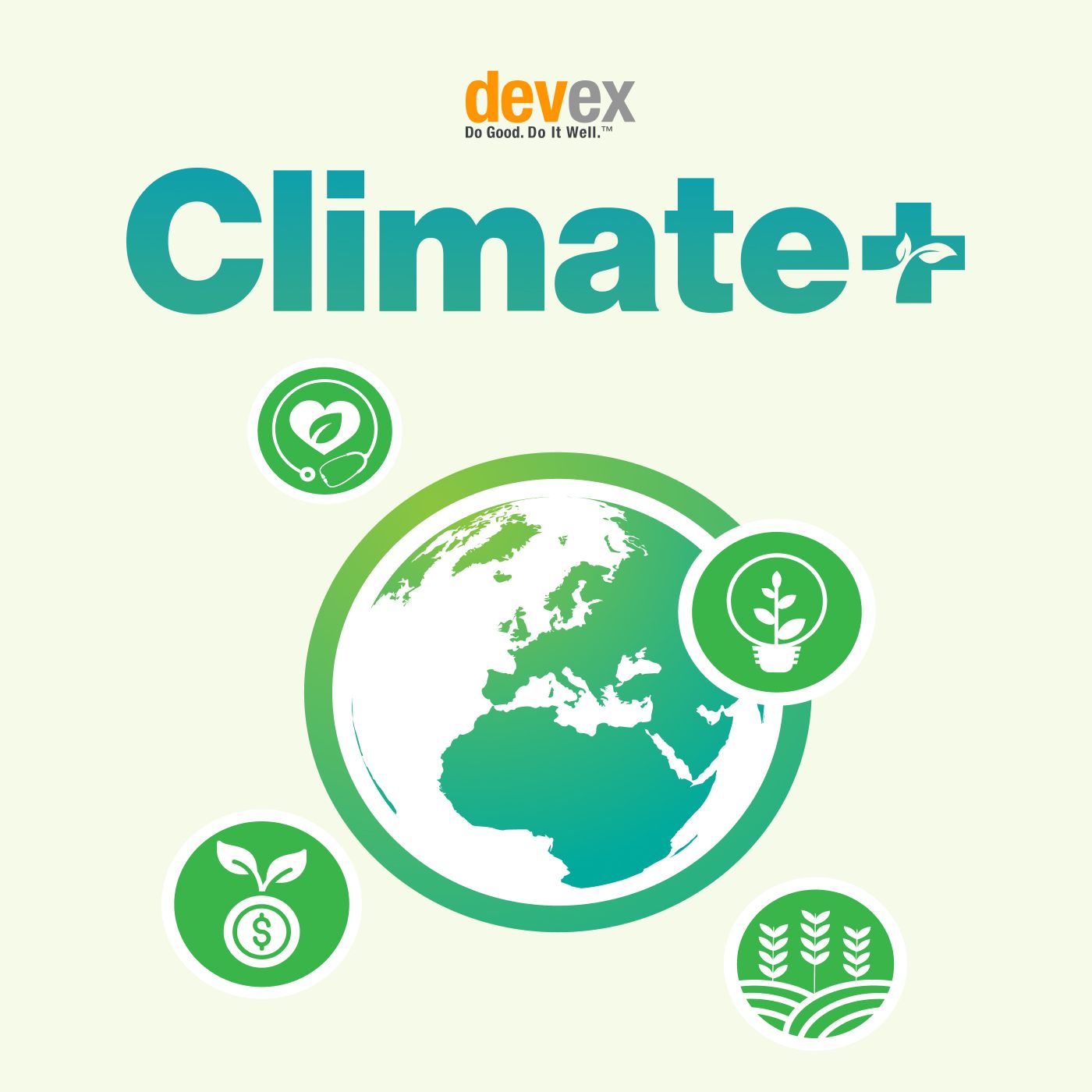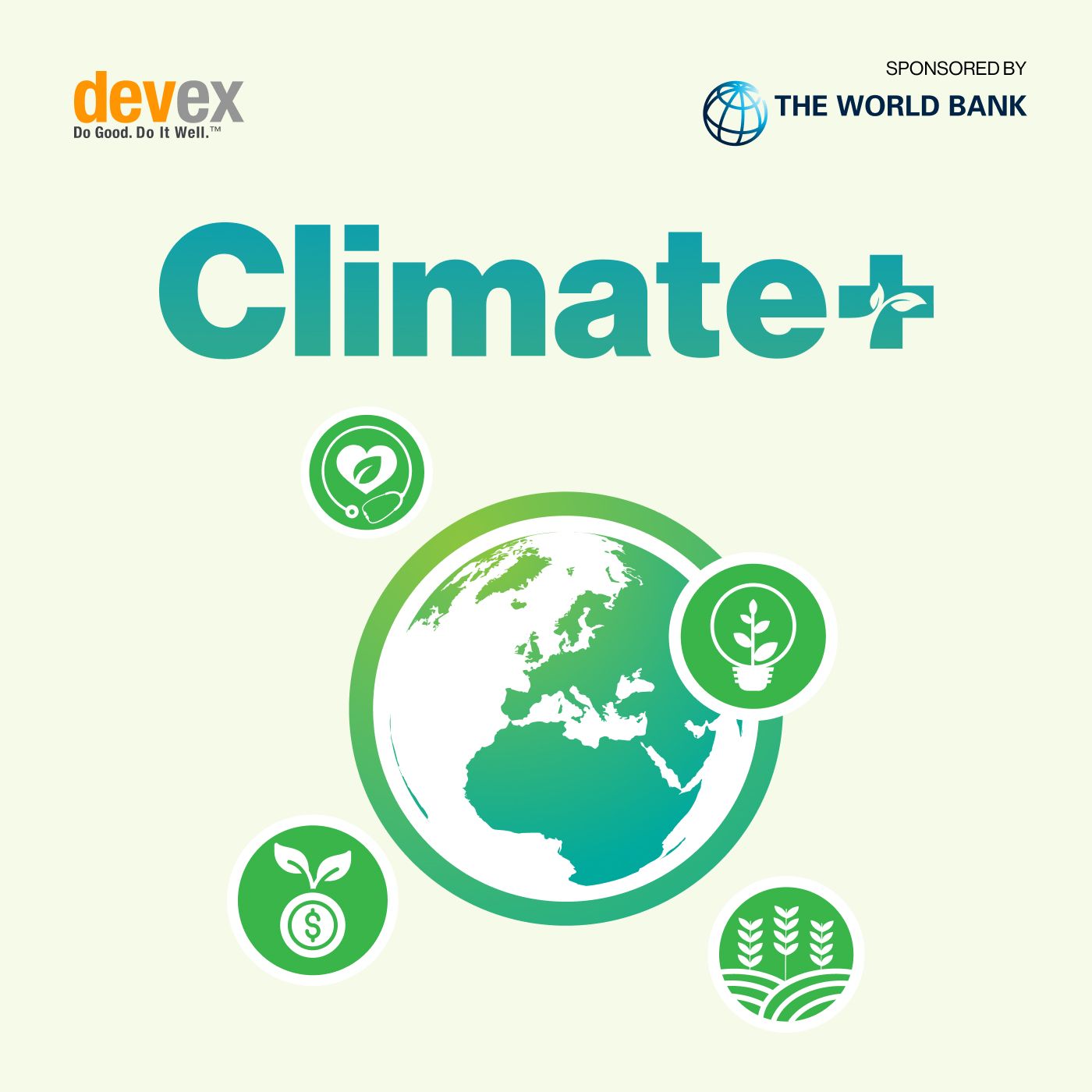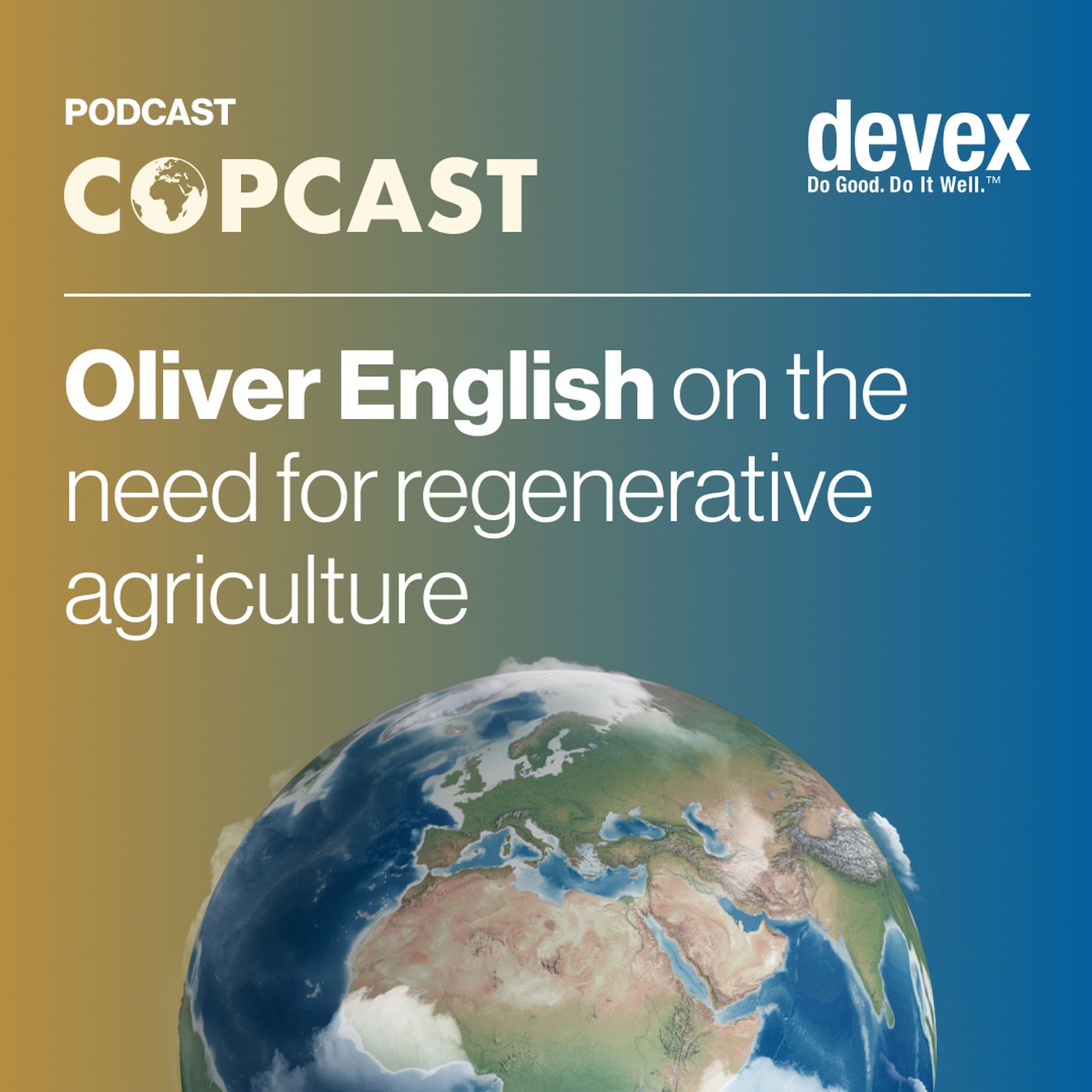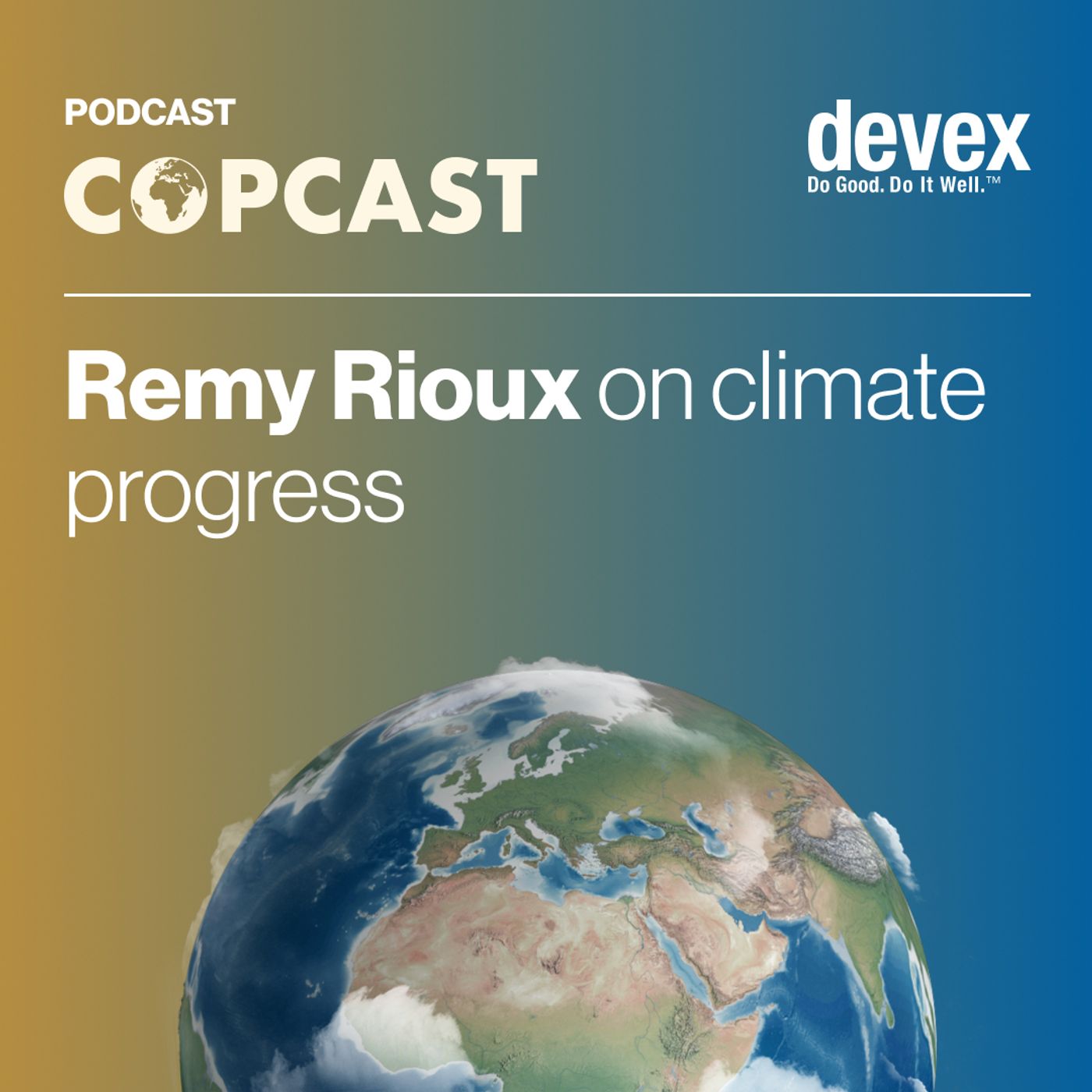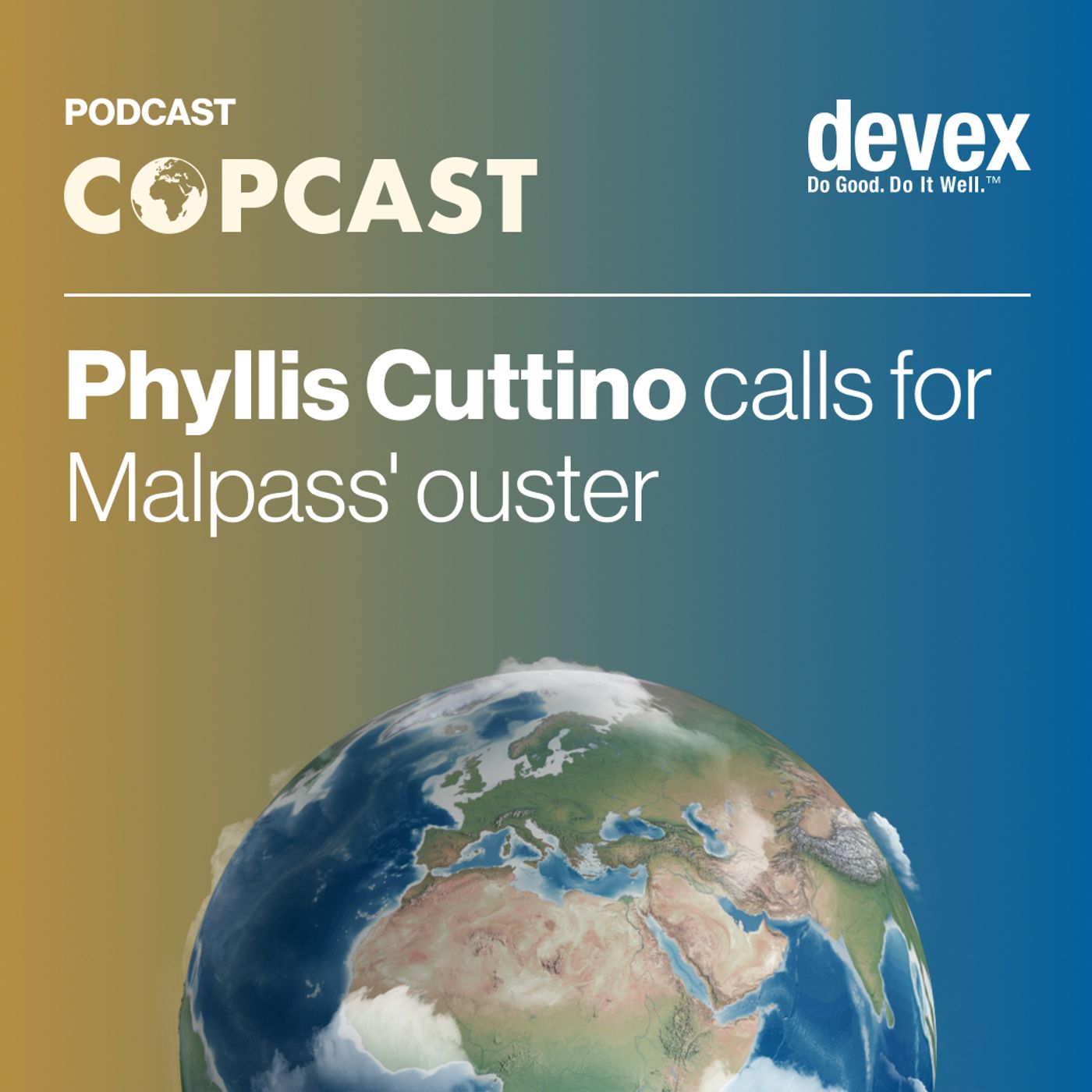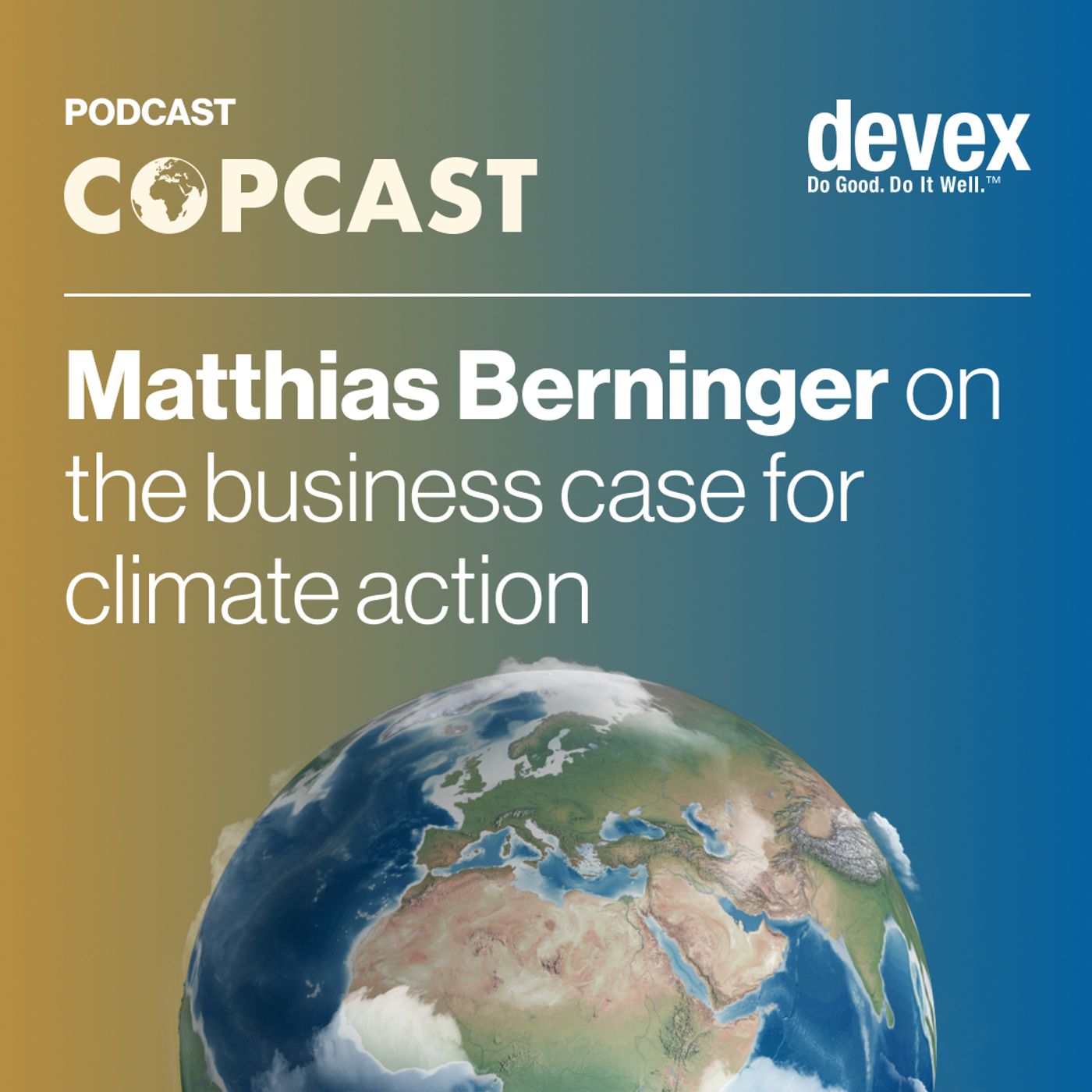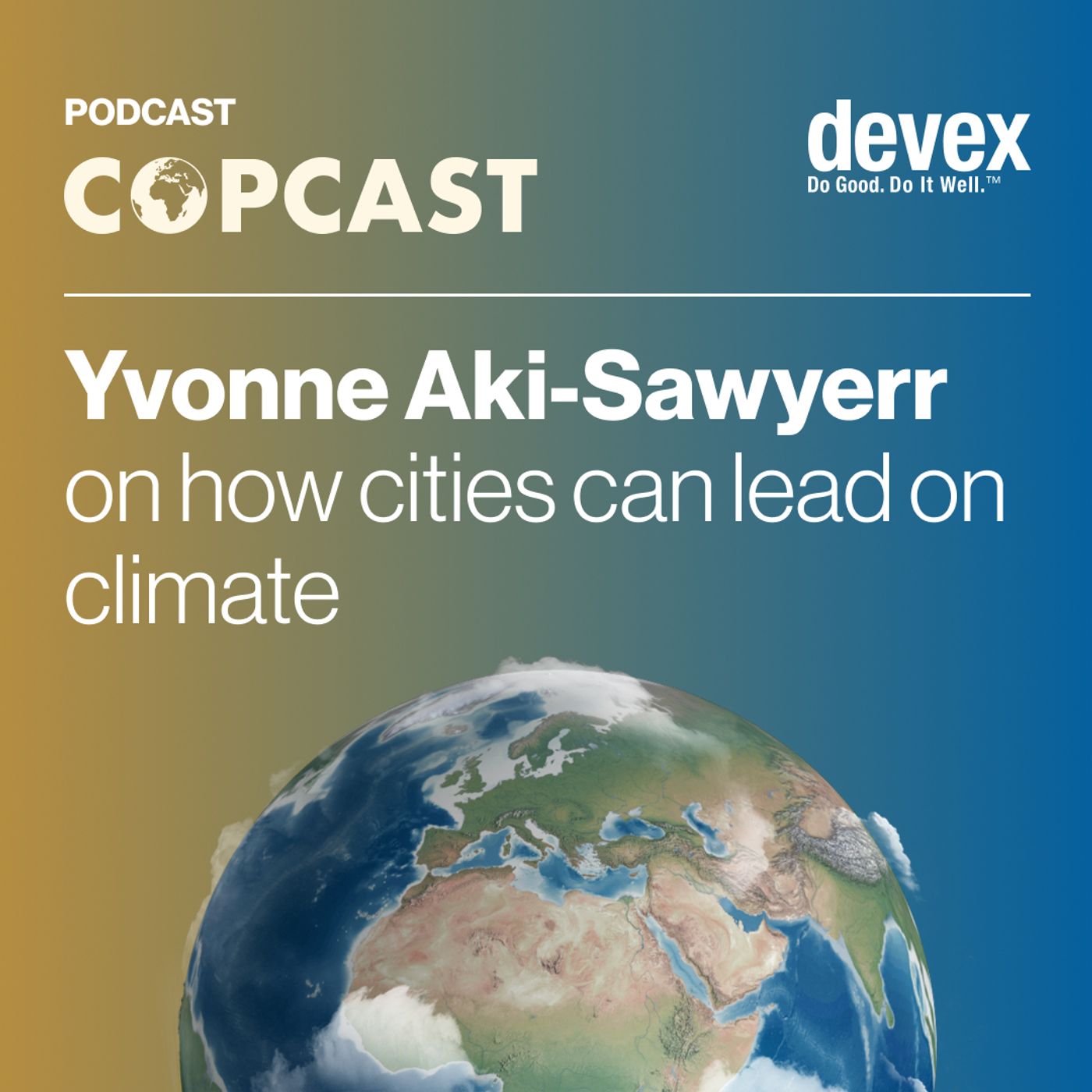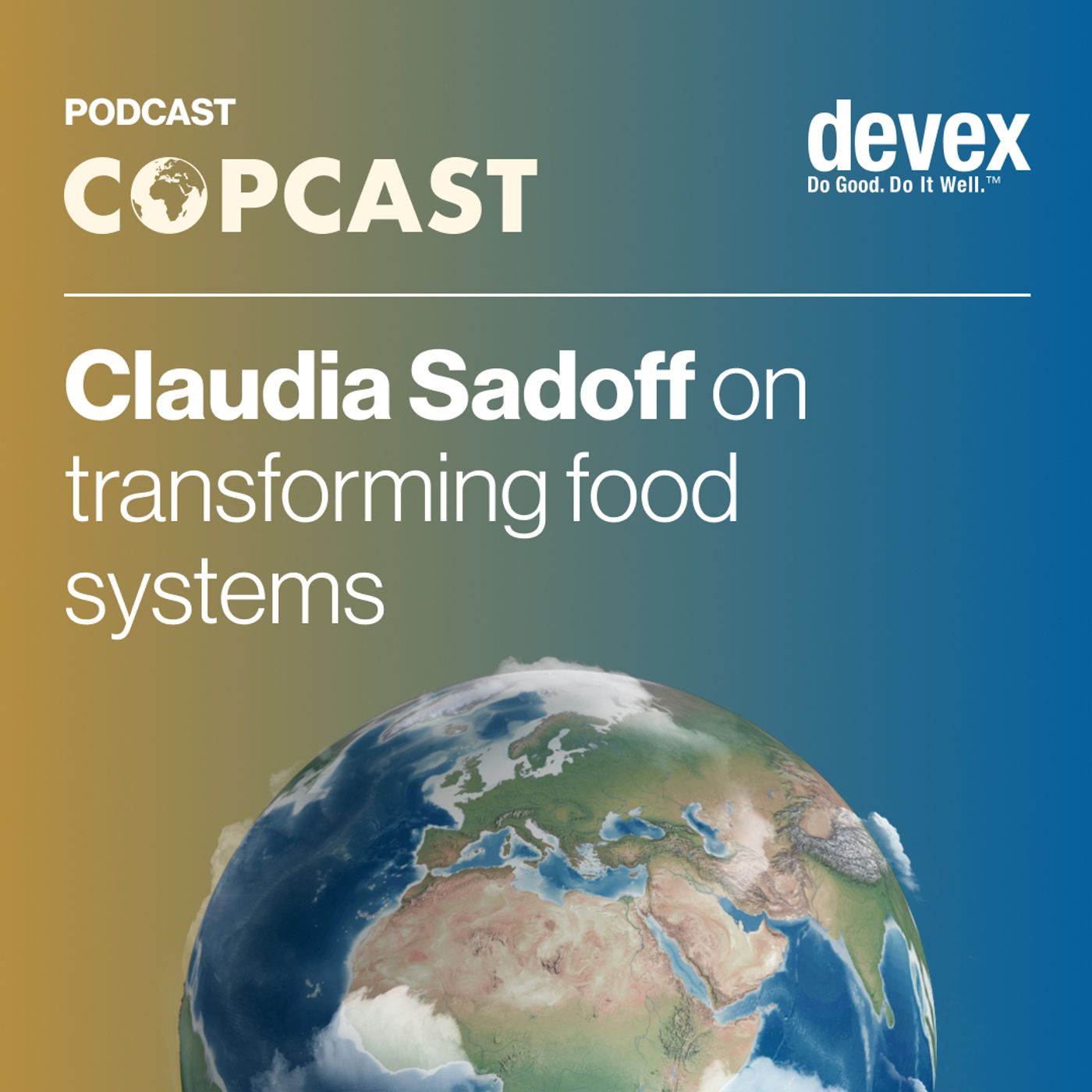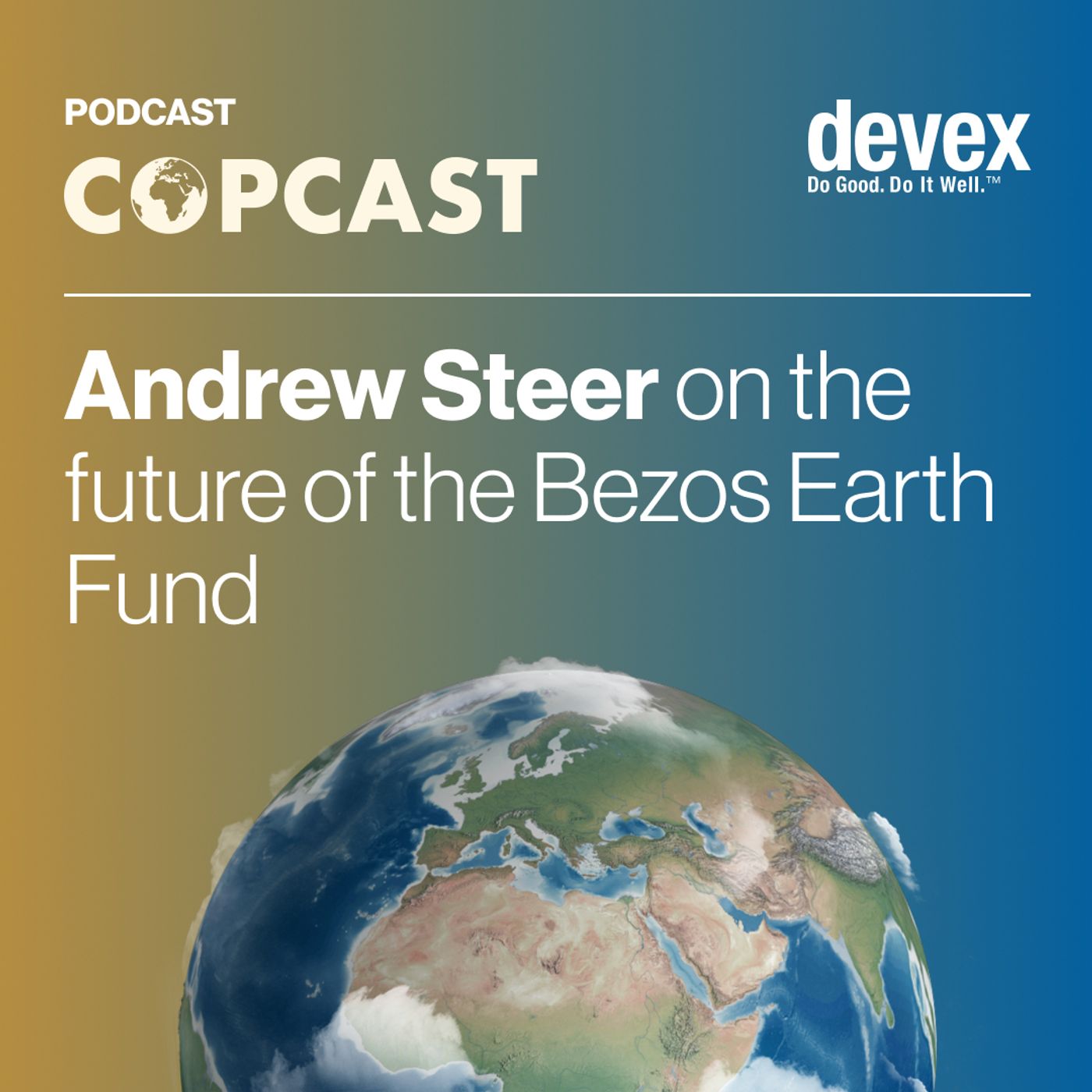Discover Climate +
Climate +

Climate +
Author: Devex
Subscribed: 6Played: 23Subscribe
Share
© Copyright Devex
Description
Politicians, scientists, and activists are heading to Dubai this year as one of the world’s largest oil producers plays host to a high-stakes climate change summit.
With countries battered by storms and strained by heatwaves, floods and droughts, can COP28 help change the trajectory of the climate crisis and preserve the planet for future generations?
Climate + is our new twice-weekly podcast, publishing in the lead up to, during, and after this year's UN climate conference.
Join Devex senior reporter Michael Igoe and the Devex team as we speak with COP insiders and experts, campaigners, and contrarians to ask — can COP28 deliver?
With countries battered by storms and strained by heatwaves, floods and droughts, can COP28 help change the trajectory of the climate crisis and preserve the planet for future generations?
Climate + is our new twice-weekly podcast, publishing in the lead up to, during, and after this year's UN climate conference.
Join Devex senior reporter Michael Igoe and the Devex team as we speak with COP insiders and experts, campaigners, and contrarians to ask — can COP28 deliver?
34 Episodes
Reverse
The agreement to operationalize a new fund for loss and damage was a key achievement of this year’s United Nations Climate Change Conference, or COP 28. But key questions remain about how that fund will work to get financial resources to countries experiencing the impacts of climate change.It’s part of a broader conversation about climate vulnerability and resilience — how to measure it, how it relates to a country’s income status, and how to quantify the costs of climate change impacts.“These are things that will be with you forever — your entire trajectory, your entire life, your entire space has changed fundamentally and in a permanent way. So the solutions cannot be sliced and diced solutions,” argues Gene Leon, president of the Caribbean Development Bank, in this episode of the Climate + podcast.Leon outlined how support for countries experiencing loss and damage due to climate change can help them regain their footing — and rediscover an economic growth trajectory on a changing planet.The Climate + podcast is supported by the World Bank.
The United Nations climate change conference in Dubai, or COP 28, was a big moment for food systems. For the first time, COP included a day dedicated to food and agriculture, which many see as an important signal that silos between climate and food policy are starting to break down.Still, less than 5% of climate finance is invested in food systems, despite the massive need for financial support for priorities such as regenerative agriculture, reducing food loss and waste, and sustainable livestock management, says Ertharin Cousin, former head of the World Food Programme, in this episode of Devex’s Climate + podcast.“Ensuring that we are part of the finance dialogue is as critical as ensuring that we are part of the substantive dialogue around the actions,” Cousin said.It’s an urgent challenge, considering existing — and increasing — levels of food insecurity, and what a changing climate likely means for those unserved by the existing food system, says Ismahane Elouafi, chief scientist at the Food and Agriculture Organization.“It’s broken because it’s not nourishing us. It’s broken because it’s part of the climate crisis … and it’s broken because we haven’t been able to use agriculture, really, to uplift people from poverty,” Elouafi said.The Climate + podcast is supported by the World Bank. To learn more about efforts to end poverty on a livable planet, check out the link.
The annual climate conferences, or COPs, have become much more than just a forum for technical and political negotiations. They’re also a convening space for representatives from the likes of civil society, academia, and the private sector. Corporations now have an increasingly significant role to play in shaping the climate conversation and — crucially — in ensuring their own operations are environmentally sustainable.For a global technology company like Microsoft, being present at COP is important not just because of the potential tools and solutions the company can offer, but also due to the implications of climate change for its business and operations, said Melanie Nakagawa, Microsoft’s Chief Sustainability Officer.Joining the Climate + podcast from COP28 in Dubai, Nakagawa shared Microsoft's priorities around investing in carbon removal, using artificial intelligence to accelerate progress on sustainability, and improving sustainability reporting mechanisms and governance. “We want to make sure corporations are stepping up and doing what they can do to rapidly reduce emissions, and… to remove what they can't,” Nakagawa said.The Climate + podcast is supported by the World Bank. To learn more about efforts to end poverty on a livable planet, check out the link.
The Paris Climate Agreement, established at COP 21 in 2015, calls for leaders and institutions across society to work towards reducing their carbon emissions with the aim of reaching net zero by 2050. Multilateral development banks, or MDBs, which have a critical role to play in the climate finance landscape, are in the process of figuring out what it means to deliver on their commitment to “Paris alignment”.“Delivery means really, for us, implementing what we have committed to do and working with the countries in which we invest in order to accompany them in this green transition,” said Odile Renaud-Basso, President of the European Bank for Reconstruction and Development, in the latest episode of the Climate + podcast. EBRD aims for 50% of its investments to be in support of the green transition by 2025, she added. Renaud-Basso joined Devex senior reporter Adva Saldinger to delve deeper into EBRD’s climate priorities, the bank’s approach and timeline for phasing out investments in fossil fuels, what MDBs can do to mobilize more private capital for climate investments, and how MDBs can work better together to support countries with their climate goals. This podcast episode was recorded with a live online audience as part of Devex’s wider Climate + event programming at COP 28.The Climate + podcast is supported by the World Bank. To learn more about efforts to end poverty on a livable planet, check out the link.
The United Nations climate conference, or COP 28, kicked off with a great deal of optimism as the loss and damage fund was established and countries made their first pledges to contribute. However, concerns remain on whether money channeled through the scheme will really reach its intended recipients. An alternative model to this is the one utilized by GiveDirectly, the U.K. charity that provides direct cash transfers to vulnerable households. To find out more about the organization — including how they might help people in areas prone to climate disasters — Devex Executive Vice President and Executive Editor Kate Warren sat down with GiveDirectly’s vice president for partnerships, Yolande Wright, for this episode of the Climate + podcast.During the conversation, Wright highlights the effectiveness of lump sum cash transfers in helping households build resilience to climate change by investing in livelihoods and improving homes, as well as their ability to address systemic issues — such as infrastructure and gender equality — to support long-term sustainable development.They also dug into the importance of having access to good data and how the rise of artificial intelligence will enable cash transfer targeting to become more efficient. “I think there’s been a tendency of development experts to spend a long time designing and consulting on programs and deciding how best donor money should be spent,” Wright points out during the conversation. She argues that people facing the challenges of climate change in the global south “are best placed to make their own decisions about how they invest their money.” The Climate + podcast is supported by the World Bank. To learn more about efforts to end poverty on a livable planet, check out the link.
For too long, Indigenous peoples were sidelined from the climate negotiations process, despite being among the most directly affected by climate change. That changed at COP 26 in Glasgow, when for the first time in the history of the UN climate conferences, indigenous representatives were invited to engage directly and share experiences with governments. Indigenous leaders, however, argue that there is still a long way to go towards having their rights sufficiently recognized. “We see that at least we have some spaces that we occupy, and mechanisms which allow better participation, but we still have to do much more at the national levels,” said Victoria Tauli-Corpuz, former United Nations Special Rapporteur on the Rights of Indigenous Peoples, in the latest episode of Climate +. Tauli-Corpuz said she and other Indigenous representatives are calling for Indigenous peoples’ rights, territories, and knowledge to be recognized in countries’ national climate mitigation plans (known as nationally determined contributions, or NDCs).Tauli-Corpuz, who is a member of the Kankanaey Igorot people of the Cordillera Region in the Philippines, also shared her own experiences of being targeted by the government as an environmental defender, why direct access to climate finance is still a pain point for Indigenous communities, and what needs to happen to safeguard Indigenous peoples’ rights in the face of the renewable energy transition. The Climate + podcast is supported by the World Bank. To learn more about efforts to end poverty on a livable planet, visit: https://www.worldbank.org/en/programs/the-world-bank-at-cop28
Although it’s now widely recognized that they must be tackled together, the goals of poverty alleviation and climate action haven’t always been seen as interlinked. In fact, some development advocates continue to worry that a focus on addressing climate change will come at the expense of immediate human needs, especially in the most low-income and fragile countries.These debates have also played out within multilateral development institutions such as the World Bank, whose mission was recently redefined from “ending extreme poverty and promoting shared prosperity” to “ending poverty on a livable planet” by the bank’s new president, Ajay Banga. “What I think Ajay Banga shifted in this conversation is recognition of the fact that poverty and environment in many domains are deeply intertwined. That a commitment to eliminating poverty is almost impossible without an equal commitment to preserving the planet,” said Richard Damania, chief economist of the Sustainable Development Practice Group at the World Bank, in this episode of Climate +.Formerly a professor of economics at the University of Adelaide, Australia, Damania has been at the World Bank for over a decade and has witnessed how the bank’s thinking has evolved during this time. “Over time now, it's just become completely mainstream. No one would wink an eyelid if you start talking, for example, about the [economic] impacts of climate change,” he said.Damania joined Devex President and Editor-in-Chief Raj Kumar for a special episode of Climate + sponsored by the World Bank. In addition to the bank’s new mission, they discussed how to measure the economic effects of climate change, how climate change is affecting the water cycle, and the damaging impacts of subsidies for agriculture, fishing, and fossil fuels.The Climate + podcast is supported by the World Bank. To learn more about efforts to end poverty on a livable planet, visit: https://www.worldbank.org/en/programs/the-world-bank-at-cop28Join Devex on Dec. 7 on the sidelines of COP 28 in Dubai or online from anywhere for the Climate + summit. Register here.
This year’s U.N. Climate Conference has already been a historic one in the nearly 30-year timespan of the COP process because it’s the first time there’s been a day dedicated to the linkages between climate change and health.Health advocates are drawing attention to the growing public health emergency surrounding the burning of fossil fuels, especially in the wake of controversial comments made by COP 28 President Sultan Ahmed al-Jaber in which he said there is “no science” that says phasing out fossil fuels is necessary to keep global warming in check.“Fossil fuel phase-out is the most effective and the most important public health intervention of our times,” said Marina Romanello, executive director of the Lancet Countdown on climate change and health. Romanello joined Devex global health reporter Jenny Lei Ravelo on the ground at COP 28 for the latest episode of the Climate + podcast.“We heard from Dr. al-Jaber talking that there’s no scientific evidence — that's absolute nonsense,” Romanello said. “There’s more than enough scientific evidence showing us that we absolutely are in trouble, that we absolutely must phase out fossil fuels.”The Climate + podcast is supported by the World Bank. To learn more about efforts to end poverty on a livable planet, visit: https://www.worldbank.org/en/programs/the-world-bank-at-cop28Join Devex on Dec. 7 on the sidelines of COP 28 in Dubai or online from anywhere for the Climate + summit. Register here.
The United Nations Climate Change Conference known as COP is an imperfect forum for achieving progress on climate change. The discourse that unfolds there is dominated by the global north. Any action agreed upon is nonbinding. It’s heavily attended — and influenced — by lobbyists for the fossil fuel industry. It may not be the forum we need, but it’s the forum we have, Kumi Naidoo, a climate activist and the former executive director of Greenpeace International, told Devex on the most recent episode of our Climate+ podcast. “The way I see COP is it's about getting the best out of the really bad system,” he said. COP’s strength lies in its power to shape the narrative around climate change, which up until this point has failed to engage both citizens and governments on the scale that it needs to. According to Naidoo, the climate movement needs to go beyond data and facts in its messaging — it needs to appeal to emotions, too. Breaking climate out of its silo and recognizing its interconnectedness with human rights, development, and economic systems is the only way forward, and COP has the potential to get that message broadcast on a large scale. "The reality is that we are seeing, on a weekly basis now, around the world, extreme weather events which are clearly climate-induced events, which are taking lives, damaging infrastructure, destroying livelihoods, and so on,” he said. “Being able to draw attention to those things using the COP as a communicative opportunity is what activism needs to do."The Climate + podcast is supported by the World Bank. To learn more about efforts to end poverty on a livable planet, visit: https://www.worldbank.org/en/programs/the-world-bank-at-cop28Join Devex on Dec. 7 on the sidelines of COP 28 in Dubai or online from anywhere for the Climate + summit. Register here.
There was a time when world leaders and climate activists mostly spoke about climate change within the framework of mitigating its impacts by taking actions such as reducing fossil fuel consumption and the flow of heat-trapping greenhouse gasses. Little was said about how to help communities adapt to the impacts of climate change. Data is consistently showing us that climate change will most heavily affect the global south through extreme weather events, including heat waves, droughts, and flooding.Nevertheless, there is room for optimism. Devex Senior Reporter Stephanie Beasley sat down with Enock Chikava, who leads the Bill & Melinda Gates Foundation’s agricultural development program, for the fifth episode of Devex’s Climate + podcast to find out about the initiatives the philanthropic organization is supporting to help the agricultural sector in the global south adapt to a changing climate. In addition to providing insights on the work being done already — such as the breeding of chickens that thrive in tropical conditions, as well as the development of an artificial intelligence-powered platform to match local crops with consumer needs — Chikava also stressed the importance of involving women in decision making and policymaking in agriculture and the need for climate finance to flow to those who need it most.Despite the positive stories, Chikava believes it is critical for the world “to realize and understand that there is a climate injustice” to help make decisions at COP 28, the U.N. climate summit, that support agricultural stakeholders in low- and middle-income countries in the face of the climate crisis. The Climate + podcast is supported by the World Bank. To learn more about efforts to end poverty on a livable planet, check out the link.Join Devex on Dec. 7 on the sidelines of COP 28 in Dubai or online from anywhere for the Climate + summit. Register here.
The Bridgetown Initiative, an ambitious set of proposals to overhaul how development finance works spearheaded by Barbados Prime Minister Mia Mottley, has been front and center of discussions about climate finance since its unveiling at last year’s United Nations Climate Conference, or COP 27.The initiative aims to address some of the inequalities that exist in the current financial architecture, such as the fact that high-income countries are able to borrow at much more favorable interest rates than lower-income countries, by calling for additional financial support to countries, help with debt restructurings, and more private capital for green projects in low- and middle-income countries.Pepukaye Bardouille, who herself comes from the climate-vulnerable Caribbean island nation of Dominica, is director of the Bridgetown Initiative unit of the Barbados government. She joined Raj Kumar on the Climate + podcast to discuss how to make development finance institutions fit for purpose and why the availability of cheaper, longer-term financing is critical for addressing climate change.“It's not just about reallocating the resources that are currently available. It's about growing the pie,” said Bardouille. “The reality is that the financing that has been committed to address the crises that we're facing globally is simply not enough.”The Climate + podcast is supported by the World Bank. To learn more about efforts to end poverty on a livable planet, visit: https://www.worldbank.org/en/programs/the-world-bank-at-cop28Join Devex on Dec. 7 on the sidelines of COP 28 in Dubai or online from anywhere for the Climate + summit. Register here.
The decision to establish a loss and damage fund to provide financial assistance to countries affected by climate disasters was hailed as one of the biggest achievements at last year’s climate conference, or COP. One year later, reaching an agreement on how that fund will be operationalized is widely seen as a benchmark for success at COP 28.While negotiators managed to agree on a draft framework for the fund earlier this month, multiple points of tension remain. Developing countries and civil society organizations were disappointed with the proposal to house the fund in the World Bank, at least for an interim period, rather than as an independent fund under the United Nations Framework Convention on Climate Change, as well as the decision to limit eligibility for funding to small island states and least developed countries rather than all vulnerable countries.Harjeet Singh has been campaigning on this issue for years, and as the head of global political strategy at Climate Action Network International, a global network of NGOs fighting climate change, he’s now calling for rich countries to stop dragging their feet while climate-vulnerable countries pay the price.“That message of hope coming out of COP 28 is extremely important. We cannot arrive at a conclusion saying it’s a work in progress,” Singh said in the second episode of Devex’s Climate + podcast. “Now it’s about really delivering it to the people and for the people.”Climate + is supported by the World Bank. To learn more about efforts to end poverty on a livable planet, visit: https://www.worldbank.org/en/programs/the-world-bank-at-cop28
Hakima El-Haite knows what it takes to host a U.N. climate conference.The former Moroccan environment minister served as vice president of COP21 — where the Paris Climate Agreement was signed — and then played a key role in bringing the next climate summit to her home country.Since then, a global pandemic, debt crisis, multiple wars and rising geopolitical tensions have narrowed the space for international cooperation.“We need to come back again and to build the trust, because today the trust is eroded. Many promises from the Paris Agreement were not kept,” El-Haite said in this first episode of Devex’s Climate + podcast.Climate + is supported by the World Bank. To learn more about efforts to end poverty on a livable planet, visit: https://www.worldbank.org/en/programs/the-world-bank-at-cop28Sign up to the Devex Newswire and our other newsletters.
In the final episode of COPcast, chef, food advocate and filmmaker Oliver English sits down with Kate Warren to discuss how regenerative agriculture and support for small scale farmers can help transform the global food system.
Rémy Rioux is chief executive officer of the French Development Agency, or AFD. But before that, in 2015, he worked as chief negotiator on the finance track of the landmark Paris Agreement on climate. Since then the United Nations Conference of the Parties has grown into a behemoth, with COP 27 in Egypt attracting 40,000 people. Devex sat down with Rioux on the sidelines of COP 27 to hear his thoughts on how the summit has changed since 2015 — and if it’s become an opportunity for greenwashing. In this wide-ranging interview, Rioux also discussed the prospects of the AFD providing loss and damage financing and supporting nuclear energy programs through its aid program, and whether human rights in Egypt were helped or hindered by the summit.
At the 27th United Nations Climate Change Conference in Sharm el-Sheikh, Egypt, the calls for the restructuring of multilateral development banks are echoing through the halls, with the hopes that with reforms, finance will flow more readily to lower-income countries to allow them to green their economies and help their populations adapt to the changing world.In the 12th episode of the COPcast, Devex sat down with Phyllis Cuttino, the new president and CEO of the Climate Reality Project, who emphasized one reform in particular: A switch up in leadership at the World Bank."Davis Malpass ... has a past where he has denied climate science and I think that makes him unsuitable to lead the World Bank at this time," she said, adding that the bank also needs to commit to only financing fossil fuel projects in the "most extraordinary of circumstances."
The private sector has a key role to play in investing in climate change adaptation – and yet, currently, only 1.6% of all adaptation funding comes from private investment.Matthias Berninger is the Head of Sustainability and Public Affairs at Bayer, but he’s seen many sides of the food and agriculture space over the course of his career: in the public sector, he was a vice minister in Germany’s Green Party; and in the private sector, he previously worked on health and nutrition strategy at Mars.In this episode of COPcast, Berninger tells Devex President and Editor-in-Chief Raj Kumar what three critical words the 5,000-word Glasgow Declaration left out, plus three things every company should be doing in order to achieve net zero by 2050.
Extreme weather devastated Sierra Leone’s capital city of Freetown in 2017 when torrential rains led to landslides that killed over 1,000 people. Now the city’s population is grappling with temperature increases and population swells due to people migrating from rural areas as erratic rainfall makes subsistence farming less sustainable. Freetown Mayor Yvonne Aki-Sawyerr is working to help her city adapt in areas such as building heat-resistant market shelters and building a cable car to cut down on emissions and pollution. She sat down with Devex on the sidelines of the 27th United Nations Climate Change Conference in Sharm-el- Sheikh, Egypt, to talk about the need for cities to have greater ownership on climate action. Aki-Sawyerr is vice chair of C40 Cities, an organization of 96 cities focused on reducing emissions and helping their populations adapt to climate change.
This year world leaders have gathered at the 27th United Nations Climate Change Summit, or COP 27, as people around the world grapple with a food security crisis.An estimated 828 million people are chronically food insecure, and 345 million people are at crisis levels or worse. They are in need of food assistance as conflict, climate shocks, and the threat of global recession drive hunger levels even higher.At COP 27, CGIAR co-hosted the first Food and Agriculture Pavilion aimed at putting the transformation of agrifood systems at the heart of the COP agenda. In this episode of COPcast, Devex’s Associate Editor Rumbi Chakamba sat down with Claudia Sadoff, executive director of the coalition, to discuss climate-smart solutions to the food crisis.
The Bezos Earth Fund is Jeff Bezos's $10 billion commitment to fund scientists, activists, NGOs, and other actors that will drive climate and nature solutions.In this episode of COPcast, Devex’s President and Editor-in-Chief Raj Kumar sat down with Andrew Steer, the fund’s CEO, to talk about the kind of projects he’s interested in and some misconceptions about the fund.This conversation was recorded as part of our Devex @ COP 27 event.


